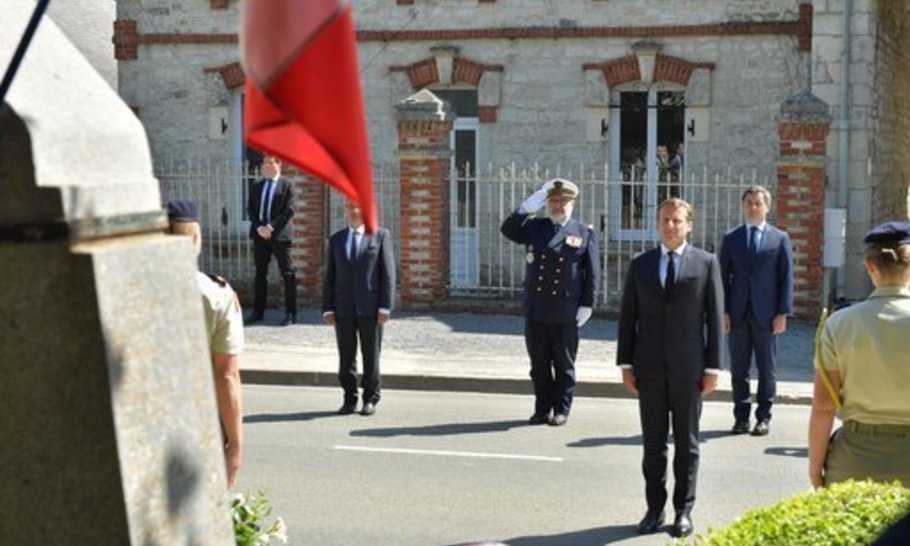How the coronavirus pandemic has highlighted national characteristics

AURELIEN LAUDY/Maxppp/PA Images
Does national character exist? The strangeness of this coronavirus interlude, during which normality has seemingly been suspended, should not blind us to the enduring and highly distinctive ways in which people deal with their predicaments. Behind the unfamiliarity of the pandemic, familiar patterns of behaviour are reasserting themselves. As they navigate these dangerous waters, our leaders resort to tried and tested traditions. In thus reverting to type, they may live down rather than up to expectations, but they unconsciously reveal a good deal about the countries they lead. In democracies, we get the politicians we deserve; in a dictatorship, the only person who decides what the people deserve is the dictator.
Compare China and the United States. Each is blaming the other for the havoc wrought by coronavirus, with the US Secretary of State — known to Chinese state media as “Evil Pompeo” — demanding answers: “We have to know where patient zero began and where patient zero became infected.” But whereas the Chinese refuse even to contemplate opening up Wuhan, the province where Covid-19 emerged, to international investigators, the Americans are already engaged in a full-scale war of words about their own handling of the crisis. While Obama and Trump lay into one another, with the former President speaking of “an absolute chaotic disaster” and the incumbent accusing his predecessor of being “grossly incompetent”, in China those who have dared to criticise Xi Jinping have now vanished. There is something reassuring about the sheer bloody-minded, noisy exuberance of democracy in America. The silence that reigns in the People’s Republic, by contrast, is deeply sinister.
Here in Europe, nations are reasserting themselves not only in their responses, with a bewildering variety of measures, but in their choices about how to lift them. The Italians, for example, are focusing on tourism, which accounts for 13 per cent of GDP. Giuseppe Conte, the embattled Prime Minister, has decided to take a “calculated risk” by opening up the country to visitors on June 3, even though it is still in danger of a second wave. The land that gave us the word “quarantine” (meaning 40 days, the centuries-old period of isolation adopted by the Venetians during epidemics) has now dropped the practice. He would like to wait for a vaccine, Conte told his compatriots, but “we can’t afford it”. Since Berlin has blocked every attempt to spread the cost of the pandemic by an EU bailout, Rome’s only hope is to lure back tourists, especially well-heeled Germans, to salvage the ailing Italian economy. And so the usually symbiotic, but periodically abusive, relationship between Italy and its neighbours north of the Alps has taken precedence once again over all other considerations.
In France, meanwhile, President Macron has invoked the memory of the greatest holder of his office, Charles de Gaulle — much to the fury of the French Right. It is 80 years since De Gaulle, after a vain attempt to resist the German invasion, led the Free French government in exile from London, which, in conjunction with the French Resistance, saved the honour of France. This “Year of De Gaulle” also marks the 130th anniversary of his birth and the 50th of his death. By wrapping himself in the mantle of the General, Macron hopes to rally the country around his own presidency, which has come under criticism for its handling of the pandemic. He will probably succeed, at least for the moment, because at present he has no credible rival. “What De Gaulle tells us is that France is strong when it knows it’s destiny, when it stands united,” the President told a commemoration at the weekend that included the great man’s grandson. But Macron’s rhetoric also risks making him look like an imposter, because their attitudes to Europe are at odds and there is simply no comparison between their achievements. Macron may admire De Gaulle, but he is certainly no Gaullist.
Here in Britain, faced with an invisible, intractable and inextinguishable adversary, we fall back on common sense. A Prime Minister who has occasionally seemed a little short of sense, though never of sensibility, tells us to trust our instincts as we emerge from lockdown. The British are better at improvising than at preparing, but we like to think that we are calm in a crisis. There has been no shortage of criticism of our political and scientific leadership, some of it justified, but there has also been a remarkable sense of community. Among those who think they know better, British exceptionalism is regarded as a myth, and a damaging one. But the degree of self-sacrifice and burden-sharing, the readiness to volunteer, the good neighbourliness and good cheer, has been striking. You can rely on the British for good old-fashioned common sense, yes, but even more on their common decency. We may or may not agree with the Government, but the country has come through this with flying colours.





